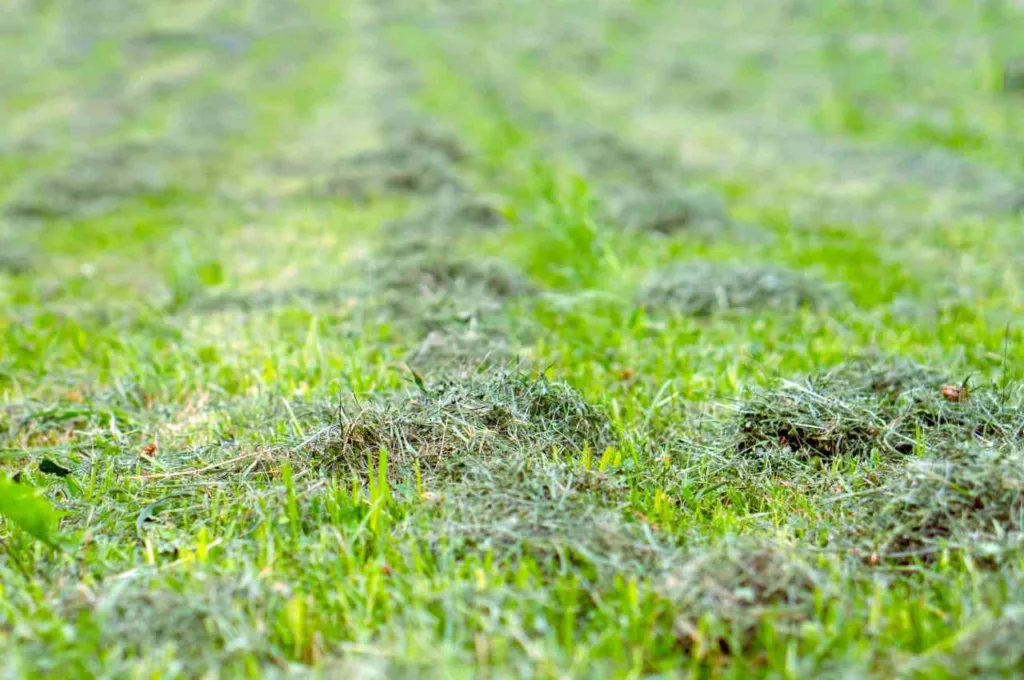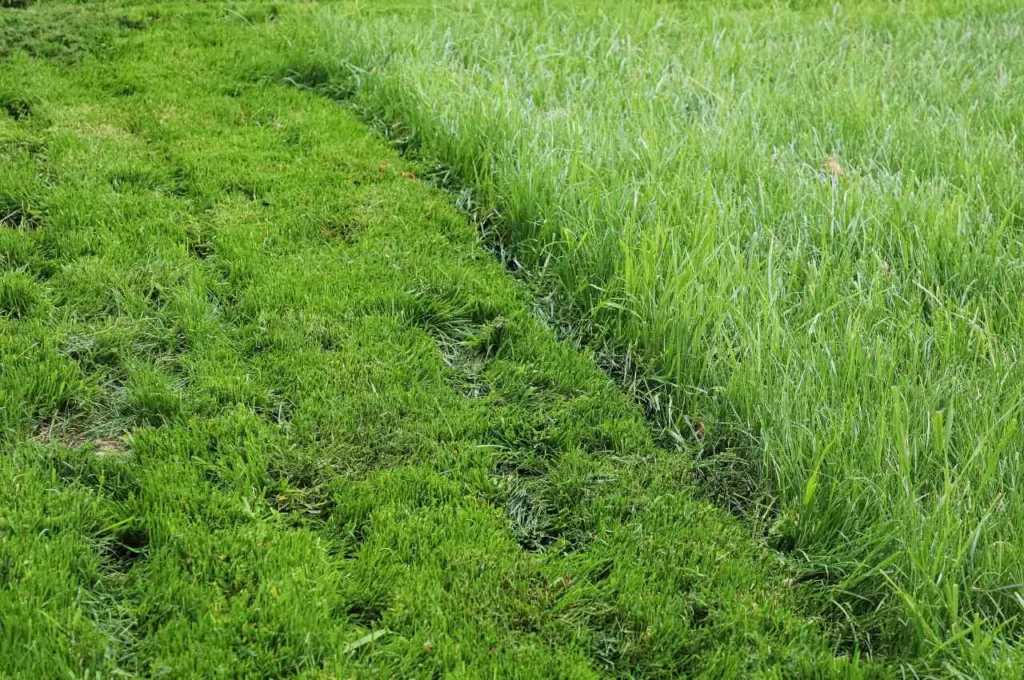If you’ve recently bought a mulching mower, you’re probably keen to know how quickly mulched grass clippings will decompose compared to normal-sized grass clippings.
We’ve shared all the most important information to know in this guide.
✅Key Takeaways:
Based on our own experience, we’d say that mulched grass clippings take up to 1 week to decompose.
In comparison, fresh grass clippings that haven’t been mulched take 3 weeks to decompose, sometimes even longer – and they usually get smelly during the process.
Mulched grass clippings decompose faster because they’re smaller than normal lawn clippings. There’s less grass to break down, so it can do so at a faster rate.
Table of Contents
🗓 Average Time For Mulched Grass Clippings To Decompose
On average, it takes mulched grass clippings up to 1 week to decompose – that’s about 2-3 weeks faster than it would take for normal-sized grass clippings to fully decompose.
So, if you plan to use your lawn mower’s mulch setting every time you mow, the previously mulched clippings should have almost completely decomposed by your next mowing session.
🤷♂️ Why Do Mulched Grass Clippings Decompose Faster?
Mulched grass clippings decompose faster because they’re smaller and sparser than the usual clumps of grass that are produced by a mower with a conventional cutting blade.
Mulching mowers use a special mulch attachment that cuts grass into small pieces. The idea of mulching is also to mow your lawn more regularly, so the mulched grass is fed onto your lawn into a thin layer, which can decompose quickly without leaving unsightly, smelly, rotting piles of grass in your garden.
So, mulched grass clippings usually have a faster decomposition rate than normal grass clippings because there’s less of them on your lawn.

🚑 How Do Mulched Grass Clippings Affect Your Lawn Health?
Mulched grass clippings have a positive effect on your lawn health because they act as a natural fertiliser, providing your lawn soil with all the nutrients (nitrogen, potassium, and phosphorous) that grass needs to grow.
By mulching your grass cuttings, you eliminate the need to invest in a lawn feed to maintain a healthy lawn because the mulched clippings deliver the same nutrients as you’d find in a fertiliser.
Our take: We were initially sceptical about mulching, but we quickly got used to the convenience of not having to empty a grass box – even if it did mean adopting a more regular mowing schedule!
Once we understood the science behind the benefits of mulching your grass clippings, we were converted. Our lawn looked greener and healthier within a few months, but it’s worth noting that not everyone wants to leave grass clippings on their lawn, no matter how small and temporary.
📑 3 Factors Affecting The Speed That Mulched Grass Clippings Decompose
There are a few factors that affect how quickly your mulched grass cuttings will decompose:
🤯The Amount Of Grass
Mulched grass clippings are much smaller than normal lawn clippings. However, the amount of mulched clippings produced depends on how much grass you cut at once.
Let’s say you’ve let your lawn grow long and you cut 4 or 5 centimetres off the grass. This will result in a larger volume of mulch than if you stick to a regular mowing schedule, mowing just 1-2 centimetres off the grass per cut.
The greater the volume of mulched clippings, the longer it’ll take for them to decompose.
☔️ Moisture/Aeration
Moisture and aeration are two key factors that affect the speed of grass decomposition.
If your mulched grass clippings don’t get a lot of airflow, or they’re exposed to very dry conditions, they’ll take longer to decompose.
The same goes for if there’s too much moisture. Mulched grass clippings on a boggy section of your lawn will decompose at a much slower rate due to a lack of oxygen. This may also cause the lawn clippings to smell bad.
❄️☀️ Temperature
There might not be anything we can do about the fluctuating temperatures here in the UK, but it’s worth noting that temperature can also affect the rate at which grass clippings decompose.
Warmer temperatures encourage faster decomposition because they facilitate microbial activity. So, you’ll probably notice that your mulched clippings decompose at a faster rate in the warmer months (as long as there’s enough rainfall – it’s all about balance!).

♻️ How To Speed Up Decomposition Of Mulched Grass Clippings
Want your mulched lawn clippings to decompose as quickly as possible? Here are our top tips to speed up the decomposition process:
Mow frequently. This has always worked best for us. In the grass-growing season (early spring to late September), get your mulching mower out at least once a week. As the hairdressers say, regular short trims are best. Mowing your lawn regularly will prevent you from overwhelming the lawn surface with an excess of mulched grass clippings, which will take longer to decompose.
Don’t cut too much off your grass. Following on from our above point, don’t cut more than one-third off your grass in a single mowing session. Cutting too much off your grass in one go will lead to a high mulch production – and all that grass will break down more slowly.
Provide optimal moisture. We get a lot of rain here in the UK, but if you’re mulching your lawn during a summer heatwave, make a habit of watering the mulched grass clippings once a day to encourage decomposition. And if you have a boggy lawn with excessive moisture, aerate the soil so the rainwater has somewhere to go rather than pooling on the surface and hindering the mulch decomposition process.
Disperse the grass clippings widely. Your mulching mower should naturally disperse grass clippings evenly on your lawn as you mow. Don’t rake up the clippings and leave them in one spot in your lawn after mowing – this will reduce their rate of decomposition.
Avoid mowing wet grass. Mowing wet grass increases the likelihood of the mulched grass clumping together. If you want your grass clippings to decompose ASAP, and you want to sustain a healthy lawn, only mow the grass when it’s dry outside.
Do a second mow. To really speed things up, mow over the mulched grass clippings a second time after they’ve been dispersed on your lawn. This will cut them up even smaller so they can decompose faster.
🏁 Final Word
In summary, mulched grass clippings usually take up to 1 week to decompose. If you’re happy to have decomposing mulch on your lawn, then we strongly recommend investing in a mulching lawn mower – all those nutrients from the mulch will do wonders for your lawn health.
Thanks for taking the time to read this article! If you liked this one, you might also like:
And don’t forget to check out the FAQs for more helpful advice below!
FAQ
Do grass cuttings rot down?
Yes, grass cuttings do eventually rot down. However, we strongly advise against leaving grass clippings on your lawn because they’ll take weeks to decompose, becoming smelly and making your lawn look unattractive in that time. Only leave grass clippings on your lawn if you have a mulching mower that cuts them up small. Mulched grass help to support a healthy lawn by feeding the soil nutrients, and the clippings are smaller, so they break down much faster.
Can I put mulched grass clippings on my compost pile?
Yes, you can put mulched grass clippings on your compost pile. However, composting grass clippings defies the point of mulching, which is when you use a special mulching mower and intentionally leave grass clippings on your lawn to decompose quickly, feeding your soil with nutrients for a healthier lawn. Mulched lawn clippings will take longer to decompose on a compost heap, and you’ll lose the benefits of using the grass as a natural lawn feed.
Should I leave grass clippings on the lawn UK?
No, you shouldn’t leave grass clippings on the lawn in the UK. We’re UK-based, and in our experience, leaving grass clippings on the lawn clogs up the soil surface and causes it to turn yellow. Plus, normal-sized grass clippings take weeks to decompose – and nobody wants rotted grass on their lawn. If you don’t want to collect in your mower, we recommend that you compost grass clippings traditionally on a dedicated compost heap, or buy a mulching mower that will cut the grass up small enough for it to break down quickly.
